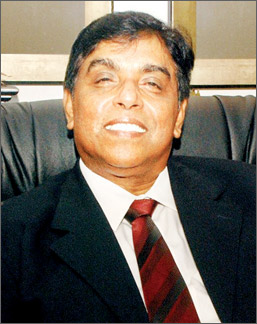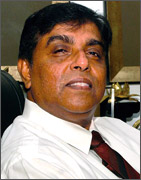“Lanka’s call rates cheapest in the world”
Shirajiv SIRIMANE

 |
|
CEO Lalith de
Silva.
Picture by Saliya Rupasinghe |
Sri Lanka Telecom Mobitel, Sri Lanka’s National Mobile Service
Provider recently announced the reappointment of Lalith de Silva as the
company’s Chief Executive Officer. No stranger to the mobile
telecommunications industry in Sri Lanka, De Silva was also Mobitel’s
first CEO to assume duty following the acquisition of the company by Sri
Lanka Telecom in 2002 and was instrumental in laying the foundation for
the company’s rapid technological and market growth.
Having started his engineering career at IBM and now hailed as a
global ICT and programme management specialist, De Silva brings with him
a vast bank of experience gained as a senior consultant at SLT, a Board
Director at SriLankan Airlines and Senior Advisor at Saudi Telecom.
Silva, a former CEO and Board Director of Mobitel was also
instrumental in pioneering developments of the company including the
introduction of GSM technology in 2004.
What are your plans for the company?
My aim is to make Sri Lanka Telecom Mobitel number one.
We are first in many fields but I want to ensure that Sri Lanka
Telecom Mobitel is the number one in all areas, soon.
I am confident and can comfortably say that I’m supported by a pool
of highly talented individuals who believe in our vision to lead Sri
Lanka.
As the National mobile telecom service provider there are other
responsibilities that are bestowed on us other than merely making
profits. So, while ensuring superior stakeholder value we will be
focusing on becoming a catalyst for National Development aligning with
the President’s vision while committing to narrow the digital divide.”
How would you explain growth prospects in the local mobile
industry as opposed to the international?
Sri Lankan mobile call and broadband charges are among the lowest in
the world.
The call charges which were at around Rs. 10 or Rs. 12 has today come
down to around Rs. 1 and the same scenario is evident in broadband and
even internet tariffs here have seen a major nosedive.
Low tariffs in the communication field are one of the main reasons
that Sri Lanka today accounts to almost 100% voice penetration in the
country.
The internet penetration which was around 1% a few years ago has
increased significantly today and internet enabled handsets have helped
to increase this margin significantly. And in that context Sri Lanka is
on par with the developed world.
Although it seems that the voice market is reaching saturation, there
is a lot of room for growth in the data based markets which can be
harnessed for the betterment of the society and thereby converting our
societies to information and knowledge rich societies eventually.
We as the National Mobile Telecom Service Provider believe that ICT
should be Available, Affordable and Accessible for the public at large
for the rapid development of this nation and that’s why we keep
investing in latest technologies such as HSPA and a trial run with LTE.
Sri Lanka is fortunate to have a proactive Telecom regulator which
has been instrumental in keeping the country ahead of neighbouring Asian
countries in introduction of new technology.
In issuing 3G licences we were even ahead of India and China.
During the last three years the government has taken some extremely
important e-government initiatives facilitating interactions with the
people and largely improving departmental functions.
The government also has the firm vision of transforming Sri Lanka
into a knowledge hub. With improvements in per capita income, computers
are becoming increasingly affordable and Internet access is becoming
more pervasive.
All this means a strong demand for broadband connectivity where Sri
Lanka still has a long way to go.
We are positioning ourselves as the foremost broadband provider in
the country. Already our 3G dongles have earned the recognition of being
the fastest, most reliable and the best in area-wise availability.
In the backdrop of low tariffs and severe competition how do you
manage profitability?
Due to low tariffs, margins in the local industry have eroded and
fierce competition has also contributed to this cause. We have taken
measures to compensate this by introducing novel technologies which help
to increase our bottom-line through minimizing cost to serve.
|

CEO Lalith de Silva |
Mobitel is also adopting several meaningful practices within the
institution to improve the company’s cost structure and one such move is
to redesign internal processes and use technological tools as much as
possible for better efficiency and effectiveness. We are looking at
implementing global best practices with regard to project, programme,
portfolio and change management for managing change in business. Minute
details are also taken care of, a good example is the initiative to
reduce the use of paper and thereby help minimize costs while helping a
greener globe. We are looking at a paperless operation.
Country is heading towards rapid development, what are your plans
for contribution to this?
At the time I left the country in 2004, none of the economic
parameters were found favourable for business and investment. While I am
upbeat on the infrastructure developments you see all around Sri Lanka I
was truly amazed to note the economic achievements that Sri Lanka has
witnessed just after a mere three years of ending a bloody separatist
war. This includes maintaining of 8% economic growth, low inflation
around 7.5% from over 20% a few years ago, stable exchange rates, lowest
unemployment, doubled per capita income compared to values that of 2004,
attracting US $ one billion FDIs and building major infrastructure
projects including international harbours, airports and the opening of
the Southern Expressway. Maintaining 30% of IT literacy too is another
major achievement. Normally a country recovering after a war would take
at least a decade to get to what Sri Lanka is today.
A decade ago, if one looked at the country, all major projects were
either carried out by colonial rulers or by ancient kings. After the
independence there was hardly anything other than the Mahaweli Project
one could talk about.
In the last six years, five international harbours including two new
harbours in Hambantota and Oluvil are being built while three others are
being elevated to international standards. The second international
airport is being built in Mattala while highways, power sector projects
and many other areas are seeing a major transformation. ICT has become a
catalyst for all these economic developments and we have committed to
contribute our fullest support by providing latest ICT infrastructure
and thereby propel our nation forward.
[email protected]
|



